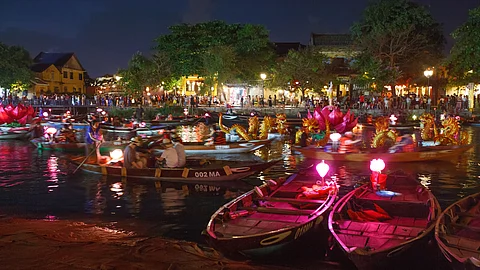
- Destinations
- Experiences
- Stay
- What's new
- Celebrating People
- Responsible Tourism
- CampaignsCampaigns
- SubscribeSubscribe
- Buy Now

How often do you venture outside to see the sights of your destination after dark? Chances are that you are probably one of those people who squeezes out their top holiday experiences and activities in the daytime, before retreating to bed after dinner and a drink. But recently, an emerging trend is taking root with travellers keen to get outside at night during their holidays. Welcome to “noctourism,” one of the most anticipated travel trends for 2025. A portmanteau of the words “nocturnal” and “tourism,” the trend refers to exploring the world after dark, whether that includes things like stargazing, midnight wildlife safaris, moonlit hikes, bioluminescent beaches or night food markets. The term encompasses a wider range of activities than astrotourism, which primarily concerns itself with stargazing experiences.
Here’s all you need to know about “noctourism.”
According to a Booking.com 2025 travel predictions report that surveyed 27,000 travellers across 33 countries, including India, 78 per cent of Indians are interested in visiting dark sky destinations for stargazing and constellation tracking experiences. The study found that 76 per cent are willing to travel for once-in-a-lifetime celestial events, 69 per cent prefer vacationing in cooler locations due to climate change concerns, 79 per cent plan activities during cooler hours, while 73 per cent aim to reduce sun exposure. An appreciation for the nocturnal world is also deepening travellers’ connections with nature, with 72 per cent seeking accommodations with minimal light pollution to preserve nature.
But, why is this trend on the rise? Perhaps it’s because the modern-day traveller is no longer satisfied with the same old experience as every other tourist. The eco-consciousness that travellers are developing thanks to climate breakdown and the biodiversity crisis is increasingly being reflected in the holidays they take, with many considering sustainable and responsible ways to travel, as well as finding new ways to connect with the more-than-human world. Furthermore, “noctourism” offers an escape into the quiet and peaceful world of the night, away from the routines and chaos of daytime.
One must be careful that they do not disrupt the very landscape they set out to explore, however. Excessive lighting, noisy events and unregulated tours can negatively affect wildlife and residents at night. Thus, choose a tour operator or local guides who genuinely practice responsible tourism principles, such as limiting group sizes to minimise impact.
The village of Hanle became India’s first dark-sky preserve in 2022 and is home to the Indian Astronomical Observatory (IAO). This is because the Hanle site is deemed to be excellent for visible, infrared and submillimetre observations throughout the year thanks to its high elevation (about 20,000 feet) and minimal light pollution. Between November and March, the high-altitude clear skies of Ladakh provide an unobstructed view of the heavens.
The night safari in Bandhavgarh National Park takes place in the Dhamokhar and Panpatha buffer zones for those keen on spotting Bengal tigers and spotted deer after dark. The winter timings are 5:30PM-8PM, and summer timings are 6:30PM-9:30PM. Similarly, Pench National Park offers night safaris in the Khawasa/Teliya buffer zones. The safari is less than three hours in the winter and starts around 6PM, before getting over between 8:30PM to 9PM. In Kanha National Park, you can go on night safaris in the Khapa buffer zone from 6PM to 9PM.
The Rann Utsav in Kutch, Gujarat, provides another stunning nocturnal adventure. Held from November to February, this cultural festival invites visitors to explore the vast salt desert of the Rann of Kutch under the light of the full moon. The salt desert, which glows under the moonlight, offers a surreal and almost otherworldly atmosphere. The beauty of the moonlit Rann, coupled with the clear night skies, makes it a prime destination for those seeking a celestial experience.
